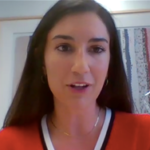INTA News
Adapting to the Digital Workplace: Overcoming Work-From-Home Challenges
Published: August 19, 2020
Mariel Chichisola Berton Moreno + Ojam Buenos Aires, Argentina Young Practitioners—Programming Subcommittee
Nevin Koshy United Trademark & Patent Services Dubai, United Arab Emirates Law Firm Committee—Well-Being for Law Firms Subcommittee
 Salsa Ahmed |
 Andrea Conde |
 David Diamond |
Does “face to face” always win the game? What are successful strategies when working at the office is no longer viable as the COVID-19 crisis continues?
Continuing its series of virtual discussions on “Adapting to the Digital Workplace,” the Young Practitioners Committee presented a panel on “Overcoming Work-From-Home Challenges,” exploring ways to successfully continue practicing trademark law and common sense while working remotely. The discussion was held on July 16, 2020, and was the third of a three-part series. The first two events were held on May 7 and May 27, 2020.
“This experience is shared in many places around the world, [and] introduced many challenges, both personal and professional, for young practitioners,” said David Diamond (Richard Law Group, Dallas, Texas, USA) in opening the discussion.
From the Programming Subcommittee, Andrea Conde (MF Brands Group, Geneva, Switzerland) posed the challenge of “organizing the workday at home,” and addressed several of the by-now familiar scenarios facing those working from home.
The setting at home might not always be ideal. “We might not have the proper workplace, plus lack of appropriate IT tools, added to home distractions,” Ms. Conde said. Try having a dedicated space—private and quiet—to create physical boundaries between work and home life. Comfortable chairs are lifesavers, she suggested. She also encouraged the participants to be bold—to ask employers to purchase a chair or back support if necessary.
“Good lighting, natural light preferable, avoids visual strains and ensures good visibility on video calls,” she said, adding that the right hardware, including a display screen, is also vital.” On software, “knowing programs or servers the company has to offer to its full potential,” and becoming familiar with online tools that are available within the company’s guidelines, can make life easier as well.
No clear beginning/end to the workday. Installing a morning routine has helped Ms. Conde, trading the time she took to get to work for a productive activity: yoga. She takes 10 or 15 minutes to start the day, helping to release stress. She also suggested routines linked to beginning or ending the workday: establishing working hours; turning off all devices when done; taking breaks; stretching; and walking.
Tasks and time management can become a struggle, same as in the office. Identify time to allocate to harder tasks. Alternating between long and easy ones can be effective, she said, adding, “Creating smart to-do lists in order of priority on IT tools provides us with reminders and alarms to increase productivity.” Identify tasks that might be delegated or eliminated. “Creating action plans with deadlines is a game changer,” Ms. Conde concluded.
Salsa Ahmed (Facebook, New York, New York, USA) presented on keeping a good workflow under the topic of “being productive and efficient at home.”
“We’re out of sight and out of mind. Having a regular set meeting with your supervisor might help keep your team accountable and improve communications,” she said. “In a remote environment where you can’t reach someone down the hall, we need to plan ahead,” she added, noting it can be helpful to communicate availability or unavailability. And, she said, “Always remember to not only think of people ahead of you; peers might need help.”
How to know when young practitioners are meeting expectations in a remote environment? “It’s crucial to ask for feedback,” Ms. Ahmed said. Know expectations for your seniority level. “Think about what you want to accomplish and set realistic expectations times for those goals.”
Professional development might be less emphasized during COVID-19. It is important to participate in virtual meetings, noting, “Keeping contact with colleagues expands our horizons. Asking supervisors to be mentors is a good one,” Ms. Ahmed said.
As to keeping in touch with colleagues, she said that setting 15-minute coffee breaks, such as a “video call in a social setting for this short period of time, might bring back social interactions of the office.” Missing office happy hours could be tempered by setting up themes (for example, creative Zoom backgrounds). To “think outside the box” is to make an effort to engage the group, she said. Losing the sense of belonging might be a side effect of lockdown, so promoting “fun activities, bingo, trivia nights, cocktail-making classes, or cooking classes in small groups can be good solutions to connecting with colleagues.”
Finally, Ms. Ahmed suggested, “It’s also okay for you not to be on video all the time.” It might have happened to all of us that we burn out our brain with numerous video calls a day, so “prioritizing and taking a day off from streaming could be a good idea from time to time.”
After the speakers addressed the challenges, Ms. Conde suggested that practitioners pay attention to their mental health given the potential lack of human interaction and detachment from colleagues. “Contacting the people we miss is key to fight this,” she said. “Friends and family might be going through the same. Calling them will certainly feel nice for both and lessen social isolation.”
It is common to adopt bad habits at home, she said. Based on her own experience, Ms. Conde recommends instituting workouts to improve productivity and health. “Regarding nutrition, it’s very positive to take the time to prepare our meals or snacks,” she said. Something everyone has struggled with during confinement—and which evoked laughter in the meeting—is, as Ms. Conde put it, how to “try to get away from the fridge.” However, she stressed that it might not be the best time for hardcore exercise routines and diets as it’s important not to be too hard on oneself during difficult times.
“We’re under particular risk of burnout and exhaustion,” Ms. Conde said. She advised getting informed about the signs of anxiety and depression, and “if you feel you are actually living those symptoms, do not hesitate to reach out for help.”
“Emotional wellbeing is key to the profession,” she said, and recommended useful tools such as free webinars and podcasts, and mindfulness and mediation apps, as well as sharing experiences. “Personally, for me, it has definitely worked,” she said.
Although every effort has been made to verify the accuracy of this article, readers are urged to check independently on matters of specific concern or interest.
© 2020 International Trademark Association